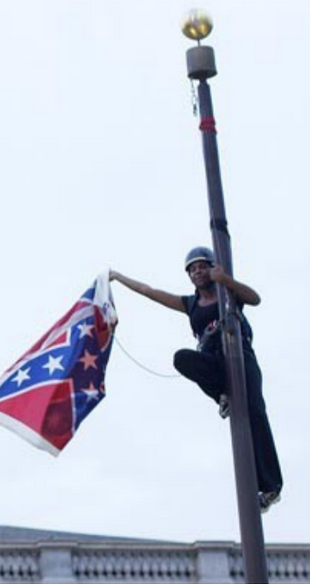St. Bede Episcopal Chapel was packed with students, faculty and alumni Wednesday night as the United Wesley Foundation of Miami brought activist Bree Newsome to speak at their first Master Lecture Series titled “Courage to Be: Bringing Down the Flag.”
Newsome gained national and international attention for her courageous act of climbing up South Carolina’s State House flagpole and taking the Confederate flag down from the pole.
“We can’t afford to be afraid. We can’t allow terror to rule the day,” said Newsome.
South Carolina officially rose the Confederate flag over their Capitol dome in Columbia on April 11, 1961 to honor the 100th anniversary of the Civil War. While the Confederate flag represents Southern heritage for some, Newsome dispels the myth of that singular narrative surrounding the flag.
“The flag was raised in response to the push by the federal government to integrate the South and the Jim Crow laws,” said Newsome.
During her keynote address, Newsome detailed her journey towards activism. An award-winning film student at New York University, Newsome figured life was going well as a black woman in America, until she heard about the shooting and killing of Trayvon Martin by neighborhood watch coordinator George Zimmerman in Sanford, Florida; Martin was unarmed at the time. A jury acquitted Zimmerman on the charges of second degree murder and manslaughter but the verdict, as well as Department of Justice investigation into the case, received widespread criticism. After Martin’s killing, Newsome said she realized there wasn’t a place of safety for people of color.
“Trayvon Martin was not in the hood somewhere and got shot in a drive-by. There was nothing you could point to in his story that said ‘Yes, it’s inevitable that this will happen to this child.’ He was simply walking home from the store,” she said.
After Martin’s tragic death, Newsome became aware that “being okay as an individual did not change the condition of my people in America.” She went back to her home state of North Carolina to protest against the state legislature’s decision to put heavy restrictions on student voters, black voters and poor voters.
Newsome, along with other young activists, decided to have a sit-in in the state capitol and risk getting arrested. The young activist was arrested for civil disobedience but reassured the audience that getting arrested is not a requirement for becoming an activist.
The decision to take down the flag was not a spontaneous idea; Newsome had been wanting to take down the flag for years. It was not until the shooting of nine members of the famous Black church Emanuel African Methodist Episcopal Church in Charleston, South Carolina that Newsome had her final straw with white supremacy. The alleged shooter, Dylann Roof, is charged with nine counts of murder, three counts of attempted murder, and possession of a firearm during the commission of a felony. He also faces federal hate crime charges, for which he faces the death penalty. Pictures of Roof found by authorities after the incident showed him posing with symbols of white supremacy.
“Going up the flagpole was something I thought I had to do,” said Newsome. She told the audience she took the massacre as a spiritual attack and knew if she missed out on the opportunity to take down the Confederate flag, she would regret it for the rest of her life.
The Wesley Foundation wanted to start off the year with a notable event to let the campus know who they are and what they are about.
“We wanted a way that we can come to UM and have a gathering where we can bring the different Christian and non-Christian organizers together and be one united front for the whole campus,” said Associate Director for the Wesley Foundation Gary Marcelin.
The conversation with Newsome on white supremacy and cultural hegemony left audience members wanting more.
“These events are extremely important in not only opening up a space for discussion but promoting action. It’s not our words that will change things, but our actions. This event was absolutely about action and everyone needs to heed to that message,” said junior Nigel Richardson.







